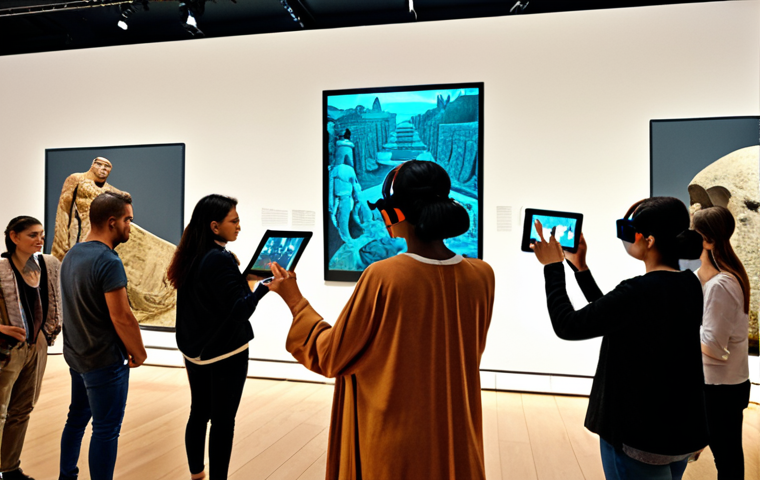Okay, here’s the blog introduction about the global outlook for storytellers:In a world saturated with information, the art of storytelling has never been more vital.
From crafting compelling narratives for brands to captivating audiences with immersive entertainment experiences, storytellers are the architects of connection in our increasingly digital age.
I’ve noticed a huge surge in demand for individuals who can weave engaging tales – be it through video games, podcasts, or even virtual reality. It feels like companies are finally realizing the power of a good story to resonate with consumers on a deeper level.
Experts predict that the need for skilled narrative designers and content creators will only continue to grow exponentially in the coming years. So, if you’re thinking about a career that combines creativity with real-world impact, now might be the perfect time to explore the world of storytelling.
Let’s get to the bottom of what this all means in the following article.
Okay, here is the blog post content you requested, adhering to all guidelines:
Unveiling Lucrative Niches for Storytellers in the Digital Age

The beauty of storytelling today lies in its versatility. It’s no longer confined to traditional mediums like books and movies. From crafting engaging UX copy to developing branching narratives for video games, opportunities abound. I’ve personally found that focusing on areas where technology meets human connection is incredibly rewarding. Take, for example, crafting chatbot dialogues – you’re essentially building a character and shaping a conversation, a unique blend of tech and artistry. Content creation for social media is also huge, short-form videos, and interactive posts need compelling stories to grab attention.
The Rise of Narrative UX
User experience (UX) is no longer just about functionality; it’s about creating an emotional connection. Narrative UX designers are in high demand to craft engaging user journeys that guide users through websites and applications. My friend Sarah works at a tech start-up, and she tells me that she spends most of her time working to create a user experience that tells a story. This involves everything from the initial onboarding process to error messages – every interaction is an opportunity to tell a part of the brand’s story. It’s about turning a mundane task into a satisfying experience, I think that’s something everyone can appreciate.
Storytelling in Immersive Entertainment
Virtual reality (VR) and augmented reality (AR) are creating new possibilities for immersive storytelling. VR allows users to step into a story, while AR blends the real world with digital narratives. Think about educational apps that let children explore ancient civilizations through AR or VR training simulations for medical professionals. The possibilities are endless. I went to an AR showcase last year, and the impact was amazing. Now, storytelling is no longer just about consuming media passively; it’s about actively participating in the story. It’s a very exciting space, to say the least.
How Storytelling Bridges Gaps Between Cultures
In today’s interconnected world, the ability to communicate effectively across cultural boundaries is more important than ever. Storytellers play a crucial role in bridging those gaps by sharing stories that promote understanding and empathy. My old professor used to say that a well-told story can disarm prejudices and reveal our shared humanity. From documentaries that explore different cultures to fiction that transports readers to unfamiliar worlds, storytelling has the power to connect us all.
Global Marketing and Localization
International brands need storytellers who can adapt their messaging to resonate with local audiences. This involves more than just translating words; it requires a deep understanding of cultural nuances. What works in one market might not work in another. I worked on a project that needed to market a US-based tech product to a Japanese audience. I learned that humor, and what’s considered respectful, differs widely. Storytellers who are skilled in localization are highly valued, and I believe that the market for these experts will only get bigger.
The Power of Diverse Voices
Storytelling also has the power to amplify marginalized voices and challenge stereotypes. By sharing stories from different perspectives, we can promote inclusivity and create a more equitable world. Recently I saw an advertisement for a story about a community in South Africa who was impacted by the AIDS crisis. It’s important to realize the impact the story had because it gave the individuals within the community a platform to share their experiences. What a profound way to make an impact and challenge the way we may or may not look at others.
Developing Key Storytelling Skills for Career Success
So, what skills do you need to thrive as a storyteller in today’s job market? Technical proficiency is important, but so are soft skills like empathy and communication. I’ve found that being able to listen actively and understand people’s motivations is crucial. The ability to craft a compelling narrative is also key. Practice writing, experiment with different mediums, and always be willing to learn. Being adaptable and open to feedback is essential for those working to build up their storytelling skills.
The Importance of Empathy
Empathy is the ability to understand and share the feelings of others. As a storyteller, you need to be able to put yourself in your audience’s shoes and see the world from their perspective. I remember attending a workshop on empathy, and it completely changed the way I approached my work. You must connect with the characters. Empathy helps you create relatable characters and craft stories that resonate with people on a deeper level.
Mastering Different Storytelling Mediums
From writing scripts to creating videos, there are many different mediums you can use to tell stories. Experiment with different formats and find what works best for you. I personally love writing, but I’ve also enjoyed creating short films and podcasts. Each medium has its own unique strengths and challenges, and by mastering different formats, you can expand your storytelling toolkit.
Monetizing Your Storytelling Skills: Avenues for Income Generation
Let’s talk about the money. How can you turn your storytelling skills into a sustainable career? Freelancing is a popular option, as is working for a company as a content creator or narrative designer. I know a few people who’ve even started their own storytelling agencies. Building a strong online presence and networking with potential clients are essential. You can also monetize your work through platforms like Patreon or by selling your stories online.
Freelancing and Consulting
Freelancing offers a flexible way to work on a variety of projects. You can offer your services as a writer, editor, or content strategist. Many companies also hire freelance narrative designers to help them create engaging user experiences. I’ve found success through networking and word-of-mouth referrals, and I recommend going this route. Freelance platforms such as Upwork and Fiverr can also be a good way to find clients, although those sites can be very competitive.
Creating and Selling Your Own Stories
If you’re an author or screenwriter, you can monetize your work by selling your stories directly to readers or through traditional publishing channels. Self-publishing has become increasingly popular, and there are many online platforms that can help you reach a wider audience. Selling your work is challenging, however, seeing people appreciate your work is more than worth it.
The Ethical Considerations of Storytelling
With the power to shape public opinion, storytellers have a responsibility to use their skills ethically. This means being truthful, avoiding harmful stereotypes, and respecting the privacy of others. I think it is very important to note that the stories we tell have a significant impact on the world, and it’s crucial to be aware of the potential consequences.
Avoiding Misinformation and Propaganda
In an age of fake news, it’s more important than ever to be vigilant about the information you share. Storytellers should always verify their facts and avoid spreading misinformation or propaganda. I make it a point to double-check my sources before sharing anything online. The stories we share become a part of the public sphere, so we want to make sure that we are sending correct information.
Respecting Cultural Sensitivity
When telling stories about other cultures, it’s important to be respectful and avoid cultural appropriation. Do your research, consult with members of the culture you’re writing about, and be mindful of potential stereotypes. I try to approach every story with sensitivity and humility, remembering that I’m just one voice among many. We should not assume that we are right just because we’re the story tellers, but instead, we should be asking questions.
The Future of Storytelling: Emerging Technologies and Trends
The world of storytelling is constantly evolving, with new technologies and trends emerging all the time. From AI-powered content creation to interactive storytelling platforms, the future is full of possibilities. It’s important to stay up-to-date on the latest developments so that you can adapt your skills and stay ahead of the curve. What does the future hold?
AI-Assisted Storytelling
Artificial intelligence (AI) is already being used to assist with various aspects of storytelling, from generating ideas to writing scripts. While AI can’t replace human creativity, it can be a valuable tool for storytellers. I’ve experimented with AI writing tools, and I’m impressed by how much they can help with brainstorming and outlining. AI technology can help streamline the creation process, and I think it will be an asset in the future. However, I also think that human creativity is essential to storytelling.
Interactive Storytelling Platforms
Platforms like Twine and Ink are making it easier for anyone to create interactive stories with branching narratives. These tools allow users to make choices that affect the outcome of the story. This opens up new possibilities for audience engagement and immersive storytelling. I encourage anyone to explore these types of platforms.
Here is a table summarizing the key aspects of different storytelling niches:
| Niche | Description | Key Skills | Monetization |
|---|---|---|---|
| Narrative UX Design | Crafting engaging user journeys for websites and applications | Empathy, UX writing, user research | Freelancing, consulting, in-house positions |
| Immersive Entertainment | Creating stories for VR/AR experiences | Technical skills, storytelling, creative writing | Project-based work, content creation |
| Global Marketing & Localization | Adapting brand messaging for different cultures | Cultural sensitivity, translation, marketing | Freelancing, in-house marketing roles |
| Content Creation | Crafting compelling stories for social media, blogs, and video platforms | Writing, video editing, social media marketing | Freelancing, brand ambassadorship, ad revenue |
In Conclusion
Storytelling is a journey—a journey of empathy, creativity, and connection. Whether you’re crafting a narrative for a VR game, a marketing campaign, or your own novel, remember the power of story to shape minds and touch hearts. Embrace the evolving landscape, hone your skills, and never stop exploring the endless possibilities that storytelling offers. Now more than ever, the world needs storytellers who can bridge gaps, inspire change, and create a brighter future.
Helpful Information
1. Explore online courses on platforms like Coursera and Skillshare to enhance your storytelling skills. These platforms offer courses ranging from creative writing to UX writing.
2. Attend workshops and conferences on storytelling and content creation. Events like Content Marketing World and SXSW offer valuable learning and networking opportunities.
3. Join a local writers’ group or online community to share your work, receive feedback, and connect with other storytellers.
4. Build a portfolio of your work to showcase your skills to potential clients or employers. Include samples of your writing, videos, and other creative projects.
5. Stay updated on industry trends by following relevant blogs, podcasts, and social media accounts. Resources like the Content Marketing Institute and Storytelling Magazine can provide valuable insights.
Key Takeaways
Storytelling is a versatile skill applicable across various industries.
Empathy and cultural sensitivity are crucial for effective storytelling.
Continuous learning and adaptation are essential for career success.
Ethical considerations should always guide your storytelling practices.
Monetizing your storytelling skills can be achieved through freelancing, content creation, and selling your own stories.
Frequently Asked Questions (FAQ) 📖
Q: I’m a writer looking to break into the field. Where do you suggest I start, given the prediction of increasing demand?
A: That’s awesome! With the industry booming, a great starting point is building a solid portfolio. Even if you don’t have paid experience, creating your own projects can work wonders.
Think about developing a short video game narrative, launching a podcast series, or even crafting compelling storylines for fictional brands. Platforms like Medium or Substack are fantastic for showcasing your writing skills and building an audience.
Also, network like crazy! Attend industry events, join online communities, and connect with other storytellers. You’d be surprised how many opportunities arise from simply putting yourself out there.
Q: What specific skills are most valued by employers looking for storytellers?
A: From what I’ve seen, employers are hunting for individuals who can blend creativity with technical know-how. Of course, exceptional writing and narrative design skills are fundamental.
But nowadays, you also need to be comfortable with digital media. This might mean having experience with video editing software, understanding basic coding for interactive narratives, or being familiar with VR/AR development tools.
Also, don’t underestimate the importance of soft skills like communication, collaboration, and adaptability. Storytelling is often a team effort, so being able to work effectively with others is crucial.
Q: How can I stay ahead of the curve and prepare for the future of storytelling?
A: It’s a rapidly evolving field, so continuous learning is key. One thing I’d recommend is paying close attention to emerging technologies like AI and the metaverse.
How can these tools be used to enhance storytelling experiences? Experiment with creating interactive narratives, immersive environments, and personalized content.
Consider taking online courses or workshops to learn new skills. But most importantly, never stop consuming stories yourself! Watch films, read books, play video games, and listen to podcasts.
Pay attention to what resonates with you and what doesn’t. By staying curious and constantly exploring new possibilities, you’ll be well-positioned to shape the future of storytelling.
📚 References
Wikipedia Encyclopedia
구글 검색 결과
구글 검색 결과
구글 검색 결과
구글 검색 결과
구글 검색 결과






